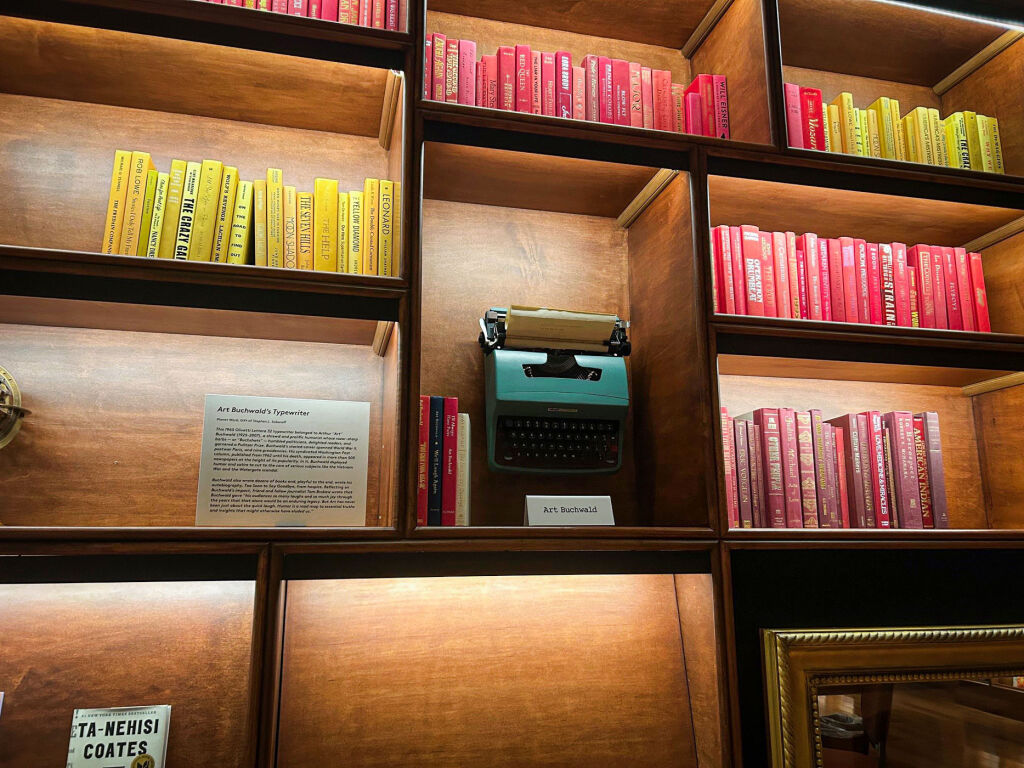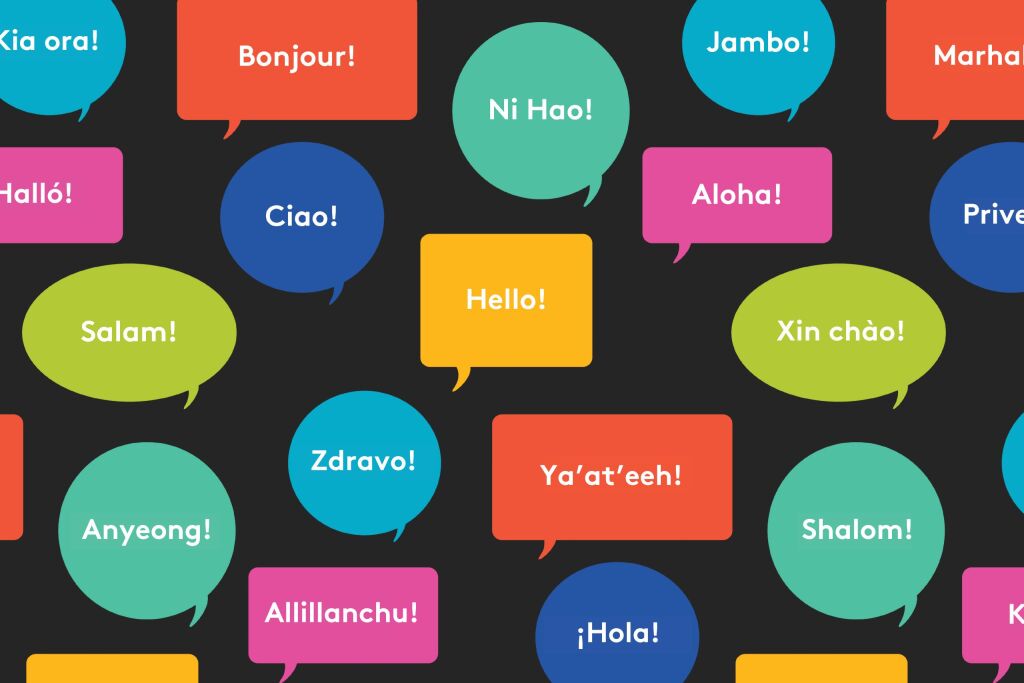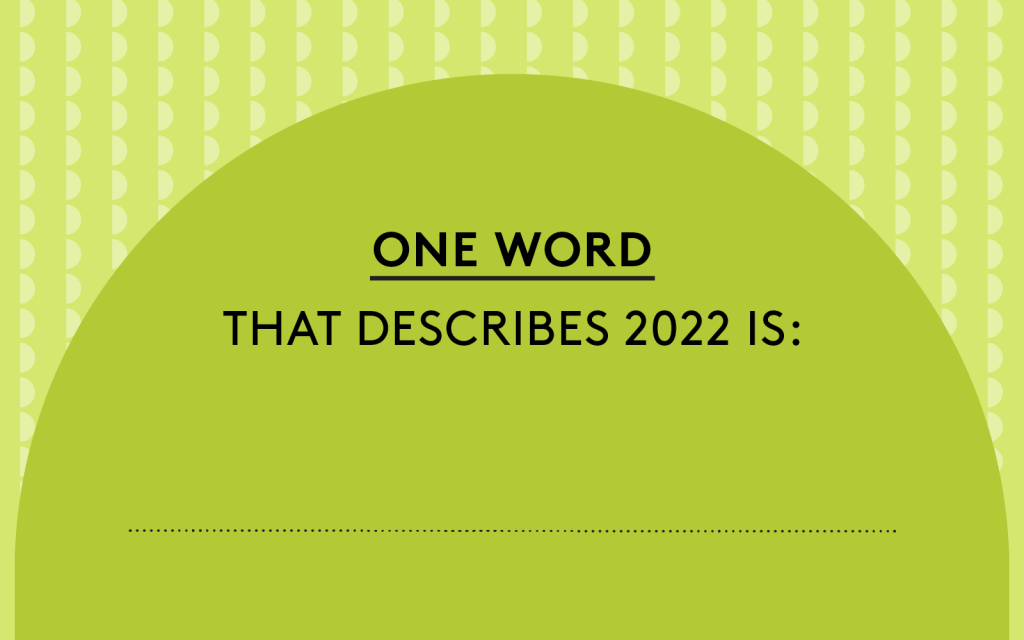Banned Books Week at Planet Word
This week, visitors to Planet Word will confront an unusual sight in the Library: books wrapped in paper, their covers obscured, the word “BANNED” stamped across them.
Banned Books Week gives us the opportunity to reflect on just how many of the books featured in our Library have been challenged or outright banned from libraries and schools. It forces us to imagine what we lose when To Kill a Mockingbird, The Diary of a Young Girl, or Between the World and Me disappear from bookshelves.
Looking closer at the list of banned books in Planet Word’s Library also gives us insight into the changing nature of censorship. In the 19th and 20th centuries, coarse language, salacious content, and objectionable depictions of religion were often-cited reasons for book bans. Immediately after its publication in 1885, librarians in Concord, Massachusetts, banned Mark Twain’s The Adventures of Huckleberry Finn — the subject of a diorama in the Library — claiming that it was not appropriate for impressionable young readers. Controversial subject matter led to bans of books by authors like F. Scott Fitzgerald, Ernest Hemingway, and John Steinbeck in the early 1900s.
The second half of the 20th century saw a steady stream of book challenges and bans, sweeping up many titles in Planet Word’s Library in the censorship tide. In the 1960s, Alice’s Adventures in Wonderland was banned for supposedly promoting drug use. In 1966, To Kill a Mockingbird faced the first of many bans for being “immoral” and “improper” for children. In the 1980s, concern over themes of puberty and sexuality prompted bans of Anne Frank’s The Diary of a Young Girl. A Wrinkle in Time ranked among the top 100 most banned books of the 1990s and 2000s for its depictions of magic and religion, and in 2006, The Curious Incident of the Dog in the Night-Time was first banned for profanity and its atheistic perspective.
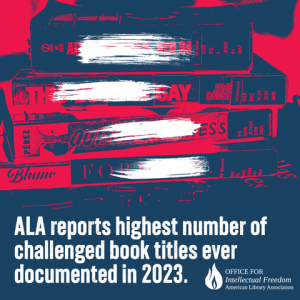
Graphic courtesy of the American Library Association (Source)
By the early 2000s, the American Library Association (ALA) reported around 350–500 book challenges per year, sometimes resulting in a ban, sometimes resulting in a book being returned to the shelves. In nearly all these cases, each challenge involved only one book. Challenges and bans dwindled in the 2010s, dipping to 116 in 2020. But since then, we’ve seen a surge of challenges and bans. The ALA reported 619 challenges in 2021, and 1,050 in 2022. Ninety percent of the books challenged in 2022 were part of attempts to ban dozens or even hundreds of titles at once. In 2023, the ALA reported 1,247 challenges, including multi-title challenges of 100 books or more in 17 states. There were 4,240 individual titles targeted for censorship, increasing by 65 percent from 2022.
The statistics are staggering, but they don’t speak to the human toll these challenges take. Earlier this month, The New York Times reported on a librarian in Louisiana who has become the target of relentless online threats and harassment because she spoke out against censorship. She is one of many librarians, administrators, and teachers facing intense pressure and vitriol as fights over book bans rage on.
The books in Planet Word’s Library caught up in this surge tell us something about these bans: Brown Girl Dreaming, Between the World and Me, Simon vs. the Homo Sapiens Agenda, Long Way Down, and The Poet X. Many of these books are written by authors of color; they deal with complex issues such as sexuality, race, and racism. The increasing volume and visibility of books telling stories like these has resulted in a backlash against them.
And those are just the books in the Library that have been fully banned from library shelves. Consider Your Name is a Song, a picture book about the beauty of names from different cultures; Save Me a Seat, the story of an unlikely fifth-grade friendship between an immigrant from India and his neurodivergent classmate; and Other Words from Home, a middle grade novel in verse about a Syrian refugee who finds a new home in Ohio. These books have also faced recent challenges — demonstrating an appetite to ban a book simply for including diverse characters or stories. This is extreme, but it’s also not entirely new. Throughout history, from The Adventures of Huckleberry Finn to The Poet X, we have banned books that make us feel uncomfortable, that push us to see outside our experiences, our identities, our worldviews. Perhaps that’s why so many of the books in Planet Word’s Library have been banned: because we seek out books that do exactly that.
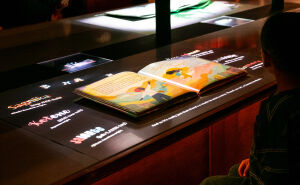
Your Name is a Song by Jamilah Thompkins-Bigelow comes to life in the Library
But there’s cause for optimism, too. One of the books in the Library, Ban This Book, tells the story of a middle school student who fights back against censorship in her school by starting a secret banned books locker library. In an interview with Planet Word about the book, author Alan Gratz noted that, while censorship has surged since he published Ban This Book in 2017, its message has remained true: “nobody has the right to tell you what books you can and can’t read.” But he also noted that, more than ever before, kids are speaking out against censorship. “Young people are learning that they can go in front of school boards, that they can go in front of Congress… that they can go in front of television cameras, and they can speak up and speak out for the causes that they believe in. And that people will listen — the future is theirs.”
Visit our Banned Books Week webpage for related blogs, reading lists, and resources.

